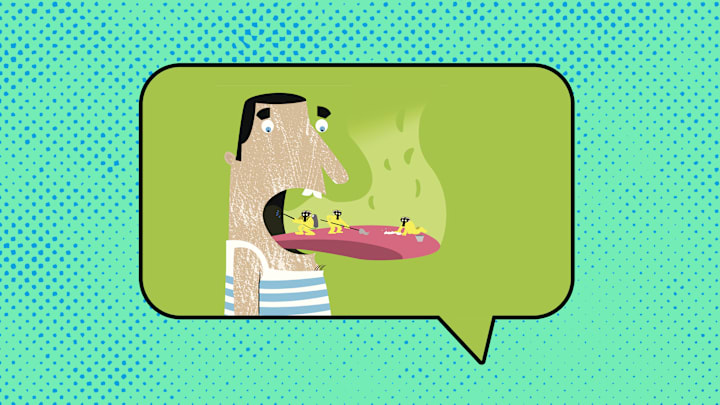Need a better word to describe what ails you? Look no further than this list of unusual terms to describe your aches, pains, and whatever else is happening in your body—some of which are quite old.
1. Acronyx
An ingrown nail, from the Greek words meaning “point” and “nail.”
2. Avinosis

The next time airplane turbulence has you reaching for that barf bag, don’t say you’re airsick—say you’re experiencing avinosis.
3. Bdelygmia
According to Mrs. Byrne’s Dictionary of Unusual, Obscure, and Preposterous Words, bdelygmia means “nausea.” A Dictionary of Psychological Medicine from 1892 defines the word, which has Greek origins, as “an old term used by Hippocrates for a morbid loathing of food.”
4. Bromopnea
Bad breath by any other name definitely doesn’t smell as sweet. Bromopnea comes from two Greek words: Bromos, meaning “stench,” and pnoe, meaning “breath.”
5. Buccula
“One of the elevated plates or ridges beneath the head on either side of the rostrum of insects of the order Heteroptera,” according to Merriam-Webster, and also a double chin, per Mrs. Byrne’s Dictionary. The word comes from the Latin for “small cheek.” Fun fact: You can also call a double chin “submental fullness.”
6. Cachexia
Another way to say your health—both mental and physical—is not so hot. It can also refer to a wasting disorder that affects the body.
7. Comfoozled

Exhausted? Tell people you’re comfoozled, a word that, according to Green’s Dictionary of Slang, was likely coined by Charles Dickens in The Pickwick Papers.
8. Desudation
Anyone walking around in the summer will want to use this word, which dates back to 1728 and means “violent sweating,” according to the Oxford English Dictionary.
9. Ecchymosis
A word for “a black and blue spot,” according to Mrs. Byrne’s Dictionary, that dates back to the 1500s.
10. Epidermophytosis
Athlete’s foot, per Mrs. Byrne’s Dictionary.
11. Epistaxis
“Bleeding from the nose; an instance of this, a nose bleed,” according to the OED.
12. Horripilation

Another word for goosebumps “caused by cold, fear, or other emotion, or nervous affection,” per the OED.
13. Kakidrosis
Kakidrosis is another word for body odor; it derives from Greek and translates to “bad sweat.”
14. Lassipedes
Another way to say you have tired feet.
15. Obdormition
Originally a 17th-century word that described falling or being asleep, obdormition came to mean “numbness of a limb” by the 1850s. So when your arm or leg falls asleep, use this fancy word to describe what’s happening instead.
16. Ombrosalgia
“Aches and pains when it rains,” according to There’s a Word for It.
17. Podobromhidrosis
Smelly feet or, as the 1913 book An Illustrated Dictionary of Medicine, Biology and Allied Sciences puts it, “offensive sweating of the feet.”
18. Saprostomous
Saprostomous means “having foul breath” and translates to “rotten mouth.”
19. Sternutation

“The act of sneezing; a sneeze,” according to the book -ologies & -isms.
20. Tragomaschalia
According to Taber’s Cyclopedic Medical Dictionary, tragomaschalia is “Malodorous perspiration … of the axilla”—in other words, smelly armpits. The word is derived from the Greek word tragos, meaning “goat,” and maschale, or “the armpit.”
A version of this story ran in 2021; it has been updated for 2023.
Are you a logophile? Do you want to learn unusual words and old-timey slang to make conversation more interesting, or discover fascinating tidbits about the origins of everyday phrases? Then get our new book, The Curious Compendium of Wonderful Words: A Miscellany of Obscure Terms, Bizarre Phrases, & Surprising Etymologies, out now! You can pick up your copy on Amazon, Barnes & Noble, Books-A-Million, or Bookshop.org.
